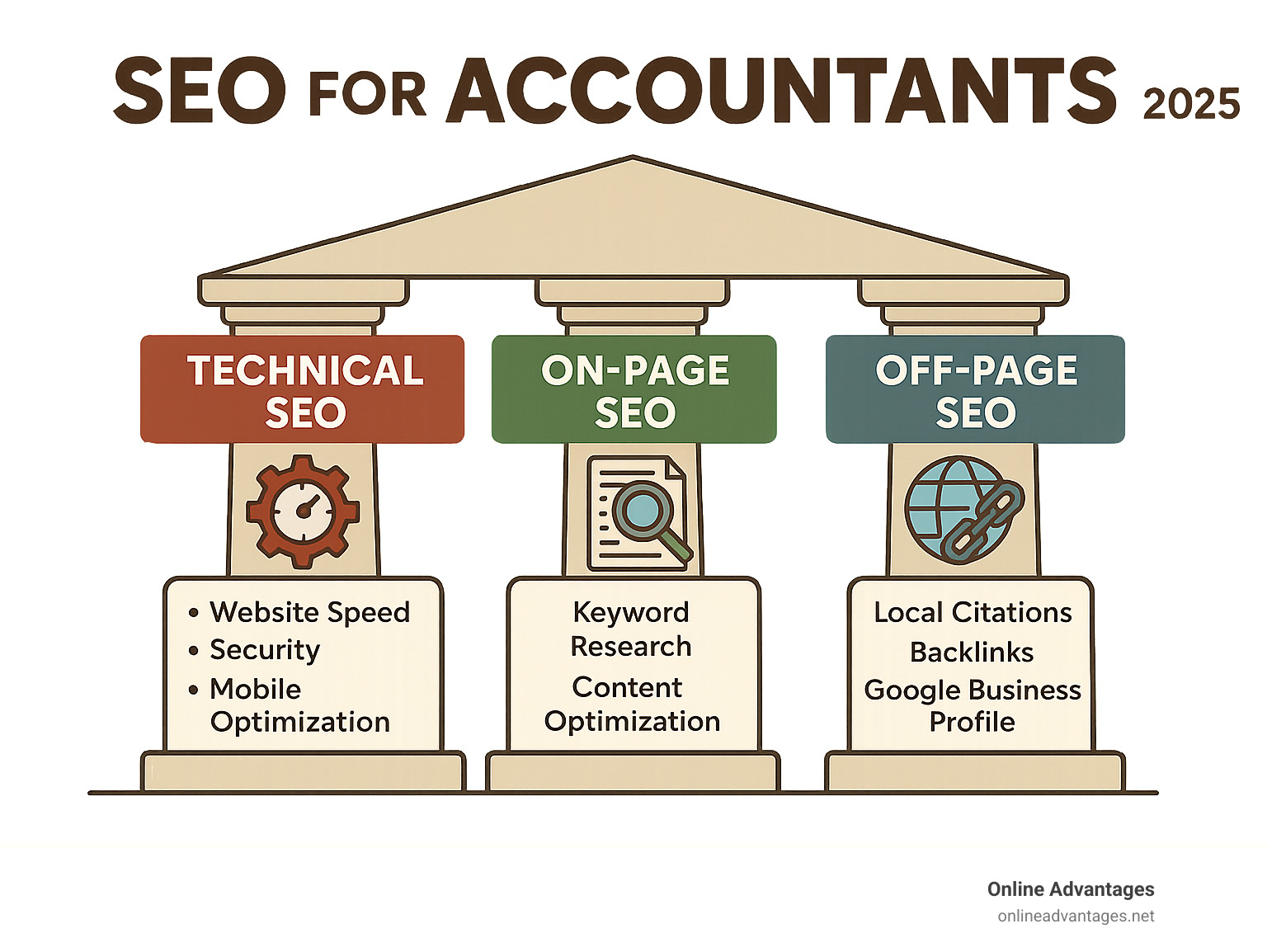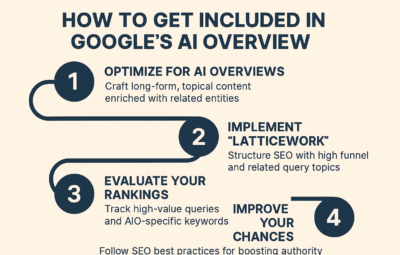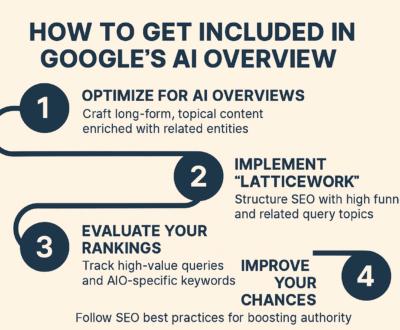Rank Higher, Grow Faster: Essential SEO for Accounting Firms
- September 7, 2025
- SEO Snapshots
Why SEO for Accountant Firms is More Important Than Ever
SEO for accountant practices has become essential as business owners increasingly turn to Google to find professional services. Here's what you need to know:
Key SEO Strategies for Accountants:
- Local SEO: Optimize Google Business Profile and target location-based keywords
- Keyword Research: Focus on terms like "CPA near me" and "tax preparation services"
- Content Marketing: Create helpful content answering common tax and accounting questions
- Technical SEO: Ensure fast loading speeds, mobile-friendliness, and secure websites
- Link Building: Earn backlinks from reputable financial and business websites
The accounting industry is experiencing a major shift. Traditional marketing methods like print ads and cold calling are losing effectiveness, while digital marketing has become the primary way potential clients find accounting services.
Research shows that 25,000 people search for "CPA Near Me" monthly in the US alone, and 46% of all Google searches are seeking local information. This means accounting firms that aren't visible online are missing hundreds of potential client inquiries.
Most accounting firms still rely heavily on referrals, creating a massive opportunity for those who accept SEO. As one digital marketing expert noted: "Hardly any accountants are doing SEO marketing, which presents a huge opportunity."
I'm Matt Maglodi, founder of Online Advantages, and I've spent over 15 years helping accounting firms achieve measurable growth through customized SEO for accountant strategies. My data-driven approach has helped dozens of small and medium-sized businesses improve their visibility, traffic, and conversions in competitive markets.

The Foundation: Mastering On-Page and Technical SEO
Think of your website as your digital storefront. Just like you wouldn't open an accounting practice in a building with broken windows and faulty wiring, you can't expect SEO for accountant firms to succeed without a solid foundation. That's where on-page and technical SEO come in – they're the digital equivalent of having a well-organized, professional office that clients actually want to visit.
On-page SEO is all about what your potential clients see and experience on your website. It's your content, your page titles, and how easy it is to find what they're looking for. Technical SEO, on the other hand, is the behind-the-scenes work that makes sure search engines can actually find and understand your site. Together, they create the foundation that everything else builds on.
When someone searches for "tax accountant near me" at 11 PM because they're stressed about their upcoming deadline, they want answers fast. Your website needs to load quickly, look great on their phone, and immediately show them you can help. That's not just good business – it's what Google rewards with higher rankings.

How to Conduct Effective Keyword Research
Here's the thing about SEO for accountant firms – you need to speak your clients' language, not your own. While you might think in terms of "tax compliance" or "financial statement preparation," your potential clients are probably searching for "help with my taxes" or "small business bookkeeping."
Keyword research is like being a detective, figuring out exactly what people type into Google when they need your services. And trust me, the results might surprise you. "CPA Near Me" gets 25,000 searches every month in the US alone, while "Accountants Near Me" pulls in another 13,000. When you add up all the accounting-related searches – from bookkeeping services to tax preparation – you're looking at over 1,000,000 monthly searches.
But here's where it gets interesting. Those high-volume keywords like "tax preparation services" are great, but they're also incredibly competitive. It's like trying to get a table at the most popular restaurant in town on Valentine's Day – possible, but tough.
That's why long-tail keywords are your secret weapon. Instead of competing for "accountant," you might target "small business accountant for dentists in Seattle." Fewer people search for it, but those who do are exactly who you want to reach. They're specific, they're local, and they're ready to hire someone.
Geographical keywords are absolutely crucial for accounting firms. Nearly half of all Google searches are looking for local information. When someone searches for "tax accountant in [your city]," they're not just browsing – they're ready to make a phone call.
The key is understanding search intent. Are they looking for information ("how to calculate capital gains tax"), trying to find a specific website, or ready to hire someone? Match your content to what they actually want, and you'll see much better results.
For keyword research tools, Google Keyword Planner is free and gives you a good starting point. More advanced tools like SEMRush, Ahrefs, and SEO.AI dig deeper and show you opportunities your competition might be missing. We typically recommend focusing on long-tail keywords with a difficulty score under 30 when you're starting out – they're your best bet for quick wins.
Optimizing Your Website's Content and User Experience
Once you know what people are searching for, you need to give them exactly what they want – and then some. Google's gotten incredibly smart about recognizing high-quality content that actually helps people. Gone are the days when you could stuff keywords into poorly written articles and hope for the best.
Your content quality needs to be exceptional. Write like you're explaining things to a friend who needs help with their taxes. Be professional, but don't hide behind jargon. Google can tell the difference between content that genuinely helps people and content that's just trying to rank.
Your title tags are like the headline of a newspaper article – they need to grab attention while clearly stating what the page is about. Keep them under 60 characters, put your main keyword near the beginning, and make them compelling enough that people want to click.
Meta descriptions don't directly affect your rankings, but they're your elevator pitch in search results. You've got about 130 characters to convince someone to click on your result instead of your competitor's. Include your keyword naturally, but focus on writing something that makes people think, "Yes, this is exactly what I need."
Use header tags (H1, H2, H3) to organize your content like you'd organize a financial report – logically and clearly. Your H1 should include your main keyword, and your other headers should break down the topic in a way that makes sense to someone skimming the page.
Readability is crucial when you're dealing with complex financial topics. Use short paragraphs, bullet points when they help, and explain things in plain English. Your expertise should shine through in your insights, not your vocabulary.
Make sure your website navigation is intuitive. If someone can't figure out how to contact you or find your services within a few seconds, they'll go somewhere else. And with mobile-friendliness being non-negotiable (60% of searches happen on mobile devices), your site needs to work perfectly on every device.
The overall user experience matters more than ever. A well-designed website doesn't just look good – it builds trust, keeps people engaged, and signals to Google that you're a legitimate, professional business. If you need help making your website both beautiful and search-engine friendly, you can find more info about our web design services.
Essential Technical SEO Elements for Accountants
Technical SEO might not be as exciting as writing great content, but it's just as important. Think of it as the foundation of a building – if it's not solid, everything else will eventually crumble. For SEO for accountant firms, getting the technical details right can make the difference between page one and page ten.
Website speed is absolutely critical. About 50% of visitors will leave if your site takes too long to load, and Google knows this. They actually penalize slow websites in their rankings. We optimize images, set up browser caching, and use Content Delivery Networks to make sure your site loads fast. Google PageSpeed Insights is a free tool that'll show you exactly where you stand.
Website security through HTTPS isn't just about protecting your clients' information (though that's obviously important). Google gives preference to secure websites, so that little padlock in the address bar is actually helping your SEO too. An SSL certificate encrypts data between your server and your visitors' browsers, building trust with both clients and search engines.
Your XML sitemap is like giving Google a detailed map of your website. It helps search engines find and understand all your important pages more efficiently. Most modern websites can generate these automatically, but it's worth checking to make sure yours is working properly.
Crawlability ensures search engines can actually access your content. This involves setting up your robots.txt file correctly and making sure your site structure makes sense. If Google can't crawl your site, it can't rank your pages – it's that simple.
Clean URL structure helps both users and search engines understand what each page is about. Instead of "yoursite.com/page1234," use something like "yoursite.com/small-business-tax-services." It's clearer and includes relevant keywords naturally.
Core Web Vitals measure how your site actually performs for real users – how fast it loads, how quickly they can interact with it, and whether elements shift around while loading. Google uses these metrics directly in their rankings, so they're worth paying attention to.
If all this technical stuff feels overwhelming, don't worry – that's exactly why we're here to help. You can find a comprehensive guide on technical SEO that covers everything you need to know to get your website's foundation rock-solid.
Building Authority: Local SEO and Content Marketing
With your technical foundation in place, it's time to build real authority for your accounting firm. This is where SEO for accountant practices really starts to pay off. Think of it this way: you've built a solid house (technical SEO), now you need to become the trusted neighbor everyone recommends.
For accounting firms, building authority happens in two powerful ways. First, you dominate your local market so nearby clients can easily find you. Second, you create helpful content that shows potential clients you truly understand their financial challenges and can solve them.
This dual approach does something magical - it builds genuine trust with your community while telling Google that your firm is the real deal. The result? More qualified leads knocking on your door.

Dominating Your Local Market with Local SEO
Here's something that might surprise you: 46% of all Google searches are looking for local information. That means when someone in your city types "tax accountant near me" at 11 PM on a Sunday, they want to find YOU, not some firm three states away.
Local SEO is absolutely critical for accounting firms, especially those serving small businesses and individuals. When done right, it puts your firm front and center when your ideal clients are actively searching.
The cornerstone of local SEO is your Google Business Profile. This free tool is incredibly powerful - it's what makes your firm appear in Google Maps and those coveted top three local search results (called the "local pack"). Getting this right can transform your lead generation overnight.
Setting up your profile properly means selecting the right business category like "Accountant" or "CPA," defining your service area, and keeping all your contact details current. Don't forget to upload professional photos of your office and team - people want to see who they're trusting with their finances.
Here's where it gets interesting: online reviews are a huge ranking factor for local search. Those five-star Google reviews don't just make you look good - they actually help you rank higher. We always encourage our clients to ask satisfied customers for reviews, and to respond professionally to every single one, good or bad.
There's also something called NAP consistency that sounds boring but matters enormously. NAP stands for Name, Address, and Phone number. If your firm's information is different on your website versus Google versus Yelp, search engines get confused and your rankings suffer. It's like having different business cards with different phone numbers - nobody knows which one is real.
Want to learn more about maximizing this powerful tool? Check out our guide on what is a Google Business Profile.
Using Content Marketing to Attract and Educate Clients
Content marketing is where your SEO for accountant strategy really comes alive. Instead of just hoping clients will find you, you're actively helping them solve problems while showcasing your expertise. It's like being the helpful neighbor who always has good financial advice, except your neighborhood is the entire internet.
Blogging is your secret weapon here. Every blog post is another opportunity to answer the questions keeping your potential clients awake at 3 AM during tax season. Think about it - someone searching "freelancer tax deductions" at midnight is probably your ideal client, stressed and looking for answers.
The beauty of content marketing lies in addressing real client pain points. Those questions you hear over and over in consultations? Turn them into blog posts. "S-corp vs. LLC" might seem basic to you, but it's exactly what a new business owner desperately needs to understand.
Google loves what they call E-E-A-T - Experience, Expertise, Authoritativeness, and Trustworthiness. Your content marketing builds all four simultaneously. When you publish well-researched articles about tax planning strategies for small businesses or retirement planning for business owners, you're proving you know your stuff.
Here's what works best for accounting content: tax tips during filing season, financial planning guides for different life stages, and business structuring advice. Industry-specific content performs especially well - think "accounting best practices for e-commerce businesses" or "tax implications for real estate investors."
The key is satisfying search intent. When someone searches "how to do a cash flow projection," they want a step-by-step guide, not a sales pitch. Give them exactly what they're looking for, and they'll remember you when they need professional help.
Content truly is king in search engine optimization. Longer articles (over 1,500 words) tend to rank better because they can thoroughly address complex topics. But remember - every word should add value. Your readers are busy business owners, not people with time to waste.
We specialize in creating content strategies that actually connect with your ideal clients and drive real business growth. Learn more about our content marketing services and see how we can help your firm become the go-to resource in your community.
Advanced Strategies and Measuring Success
You've built a solid foundation and established your local presence – now it's time to take your SEO for accountant strategy to the next level. Think of this phase like growing your practice beyond your initial client base. You're ready for more sophisticated approaches and, most importantly, you need to track what's actually working to ensure you're getting a strong return on your investment.
This is where the real magic happens. Advanced SEO isn't just about getting more traffic – it's about building lasting authority in your field and making smart, data-driven decisions that translate into real business growth.

The Role of Link Building and Future SEO Trends
Picture this: you're at a networking event, and several respected business leaders mention your firm as their go-to accounting expert. That's essentially what happens when other websites link to yours – they're giving you a digital endorsement. These backlinks are like votes of confidence that tell Google your site is valuable and trustworthy.
Building quality backlinks requires a strategic approach. Guest blogging has proven incredibly effective for accounting firms. When you write insightful articles for industry publications or business blogs, you're not just sharing your expertise – you're earning valuable links back to your site. Imagine writing a guest post about "Tax Planning for Small Businesses" for a popular business magazine. That article showcases your knowledge while earning a high-quality backlink.
Digital PR takes this concept further. When you provide expert commentary to news outlets, conduct original research, or partner with local organizations on community initiatives, you create opportunities for natural link building. Local newspapers love quoting tax experts during filing season, and these mentions often include links to your website.
The digital landscape is evolving rapidly, and AI is changing everything. Google's new AI-powered search features mean users sometimes find answers directly on the search results page without clicking through to any website. This makes competition fiercer, but it also creates new opportunities. When your content provides clear, authoritative answers, it's more likely to appear in these AI-generated summaries.
Voice search is another game-changer. People ask their smart speakers questions like "What business expenses can I deduct?" in natural, conversational language. Optimizing your content for these longer, more natural queries can capture this growing search trend.
Staying ahead means constantly adapting. Google controls over 90% of the global search market, so when they update their algorithms, we need to adjust quickly. The recent completion of mobile-first indexing, new schema markup opportunities, and emerging Google features all require ongoing attention and adaptation.
How to Measure Your SEO Success
Here's the truth about SEO: if you're not measuring your results, you're essentially flying blind. For SEO for accountant firms, tracking performance isn't just about pretty charts – it's about understanding which strategies are actually bringing in new clients and growing your business.
Google Analytics serves as your digital dashboard, showing you exactly how people find and interact with your website. This free tool reveals whether your organic traffic is growing, how long visitors stay on your site, and which pages resonate most with potential clients. Setting up a Google Analytics account requires just a Google account, and the insights you'll gain are invaluable.
Google Search Console gives you a direct line to Google's perspective on your website. It shows you which keywords are bringing people to your site, how often your pages appear in search results, and alerts you to any technical issues that might be hurting your rankings. Think of it as Google's report card for your website.
The metrics that matter most tell the real story of your success. Organic traffic – visitors coming from unpaid search results – directly measures your SEO effectiveness. Keyword rankings show where your pages appear for important search terms, while your bounce rate indicates whether visitors find what they're looking for or leave immediately.
Most importantly, conversions measure the actions that matter to your business: contact form submissions, phone calls, and consultation requests. These metrics transform SEO from a numbers game into a lead generation powerhouse.
Understanding the difference between SEO and paid advertising helps put your investment in perspective. Pay Per Click Management (PPC) delivers immediate visibility but stops working the moment you pause your campaigns. SEO builds lasting value – that blog post you write about tax deductions could attract new clients for years without additional cost. While PPC offers quick wins, SEO creates sustainable growth and long-term brand authority.
The long-term ROI of SEO makes it one of the smartest investments for accounting firms. Like a well-planned retirement portfolio, SEO benefits compound over time. Consistent effort leads to higher rankings, more organic traffic, increased leads, and ultimately a more stable client base. It's scalable marketing that continues delivering value long after the initial work is complete.
By diligently tracking these metrics and making data-driven adjustments, you ensure your SEO strategy always optimizes for maximum impact and healthy returns on your investment.
Frequently Asked Questions about SEO for Accountant Firms
We get it – diving into SEO for accountant firms can feel like learning a whole new language. After working with dozens of accounting practices over the years, we've heard the same questions come up again and again. Let's tackle the big ones that are probably on your mind too.
What are the most important parts of an effective seo for accountant strategy?
Think of effective SEO for accountant firms like building a house – you need a strong foundation, solid walls, and a roof that protects everything underneath. Here's what that looks like in the digital world:
Local SEO is your foundation. Most accounting firms serve clients in their local area, so you absolutely need to nail this part. Your Google Business Profile should be completely filled out and actively managed. Those online reviews? They're gold – both for attracting new clients and for Google's algorithm. Make sure your business name, address, and phone number are exactly the same everywhere online. It sounds simple, but you'd be surprised how many firms miss this.
High-quality content forms your walls. This means creating blog posts, service pages, and resources that actually help people. When someone searches "how to prepare for tax season," your content should give them real, actionable answers. Google rewards websites that genuinely help users, and your potential clients will see you as the expert they want to hire.
Technical website health is your protective roof. Your website needs to load fast, work perfectly on phones, and be secure with HTTPS. If someone can't easily use your site on their mobile device, they'll bounce right over to your competitor. Google notices this too, and it hurts your rankings.
How long does it take for SEO to start working for an accounting firm?
This is probably the question we hear most, and I totally understand why. You're investing time and money, so you want to know when you'll see results. Here's the honest truth:
You'll start seeing some movement in the first 3-6 months. This is when you might notice your Google Business Profile showing up more often in local searches, or maybe you'll start ranking for some of those longer, more specific search phrases. It's exciting when it happens, but don't expect a flood of new clients just yet.
The real magic happens between 6-12 months. This is when consistent effort starts paying off in a big way. Your blog posts begin ranking higher, more people find your website through search, and most importantly, you start getting more qualified leads – people who are actually ready to hire an accountant.
But here's the best part about SEO – it's a long-term investment. Unlike paid ads that stop working the moment you stop paying, that blog post you wrote about small business tax deductions could keep bringing you clients for years. We've seen accounting firms still getting leads from content they published three years ago. That's the compound effect that makes SEO so powerful.
Can I do seo for accountant tasks myself or should I hire an agency?
This is such a practical question, and the answer really depends on your situation. Let me break it down honestly:
You can definitely handle some DIY basics. Setting up your Google Business Profile is something any accountant can learn to do. Writing helpful blog posts about topics you know inside and out? That's actually a great place to start. After all, you're the expert on tax law and business finances – you just need to share that knowledge online.
But here's where it gets tricky. The technical stuff can be overwhelming. Things like fixing site speed issues, understanding why Google isn't crawling certain pages, or figuring out the right keywords to target – these require specialized knowledge and expensive tools. It's kind of like how your clients could technically do their own taxes, but they hire you because you're the expert.
The real question is about your time. Every hour you spend learning SEO is an hour you're not serving clients or growing your practice. When we work with accounting firms, they often tell us they tried the DIY route but got frustrated with the time commitment and technical complexity. An experienced agency brings the expertise and tools to get results faster, while you focus on what you do best – helping your clients with their finances.
The choice isn't right or wrong – it's about what makes sense for your practice right now. If you're just starting out and have more time than budget, learning the basics can be valuable. But if you're ready to see serious growth and want to compete with the bigger firms in your area, professional help usually pays for itself pretty quickly.
Conclusion: Your Long-Term Strategy for Growth
Think of this moment as a crossroads for your accounting firm. You've just finded the roadmap to digital success, and now it's time to decide which path to take. SEO for accountant firms isn't just another marketing tactic you can try when you have spare time – it's become the foundation that separates thriving practices from those struggling to find new clients.
We've walked through the essentials together: building that solid technical foundation with on-page optimization, establishing your local presence so neighbors can find you easily, creating valuable content that positions you as the go-to expert, and implementing advanced strategies that keep you ahead of the curve. Each piece works together like a well-balanced financial portfolio – diversified, strategic, and designed for long-term growth.
Here's what makes SEO so powerful for accounting firms: it's working for you 24/7. While you're sleeping, your optimized website is attracting potential clients who are searching for exactly the services you offer. That blog post you wrote about tax planning six months ago? It's still bringing in qualified leads. Your Google Business Profile? It's showcasing your expertise to local business owners right now.
The accounting industry is experiencing a fundamental shift. Firms that recognize this digital change and act on it are building sustainable competitive advantages. They're reducing their dependence on referrals, attracting higher-quality clients, and growing their practices predictably. Meanwhile, those who wait are watching potential clients find their competitors instead.
At Online Advantages, we've spent over 15 years perfecting the art and science of digital marketing for professional services. We understand that every accounting firm is unique, with different specialties, target markets, and growth goals. That's why we create customized SEO for accountant strategies that reflect your firm's personality and expertise.
Your potential clients are out there right now, typing "CPA near me" or "small business accountant" into their phones. The question isn't whether they'll find an accounting firm – it's whether they'll find your firm. The firms that invest in SEO today are the ones that will dominate their markets tomorrow.
Ready to stop leaving money on the table and start attracting the clients you deserve? Your competition isn't waiting, and neither should you. Get started with our professional SEO services and let's build your firm's digital future together.
About us and this blog
We are a digital marketing company with a focus on helping our customers achieve great results across several key areas.
Request a free quote
We offer professional SEO services that help websites increase their organic search score drastically in order to compete for the highest rankings even when it comes to highly competitive keywords.
Recent Posts
View all projectsMore from our blog
See all postsRecent Posts
- How to Promote Last-Minute Black Friday Deals with SEO, AIO Search Fast With Online Advantages November 21, 2025
- The AI Overview Detective: How to Confirm Your Featured Status September 10, 2025
- Google Ads: Take Back Control of Your Online Experience September 10, 2025
















